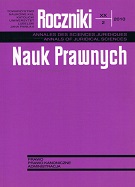Europejskie ugrupowanie współpracy terytorialnej - nowe ramy transgranicznej współpracy terytorialnej
European Grouping of Territorial Cooperation - a New Frame of Cross-Border Territorial Cooperation
Author(s): Marcin Mazuryk, Katarzyna Miaskowska-DaszkiewiczSubject(s): Law, Constitution, Jurisprudence
Published by: Towarzystwo Naukowe KUL & Katolicki Uniwersytet Lubelski Jana Pawła II
Keywords: European Grouping for Territorial Cooperation; cross-border cooperation of local government; Europejskie Ugrupowanie Współpracy Terytorialnej; współpraca transgraniczna samorządu terytorialnego
Summary/Abstract: In the face of problems and phenomena that go beyond national boundaries there is a need for joint initiatives, sharing ideas, cross-border approaches and solutions. To meet these new problems, the European Union forwarded to each Member State, their regional and local authorities the legal instruments allowing for more efficient resolution of cross-border problems by using the potential of cooperation within the European Grouping of Territorial Cooperation. The EGTC regulation is a major step forward in providing integration possibilities between regions of different Member States as it gives a solid and simplified frame for cooperation activities. The interested parties-members of an EGTC from different Member States can work on joint initiatives without having to sign international agreements. EGTC members can independently select the subject of its activity in cooperation, as well as determine the decisionmaking process and internal rules of conduct. Notably, they can respond directly to the notice of competition in the EU policy concerning the reporting of project proposals and present them as an organizational entity, without the need to involve government agencies of the entities participating in an EGTC. European Groupings of Territorial Cooperation are finally a clear and strong political signal of the European Council and Parliament that the cooperation with partners from other EU Member States is important and is supported at the highest political level in the European Union. For a positive assessment of the idea of an EGTC is not without significance that wellfunctioning EGTC can contribute to achieving the objective of territorial cohesion, multi-level governance in Europe, the development of macro-regions and the European Neighbourhood Policy.
Journal: Roczniki Nauk Prawnych
- Issue Year: 20/2010
- Issue No: 2
- Page Range: 247-261
- Page Count: 15
- Language: Polish

